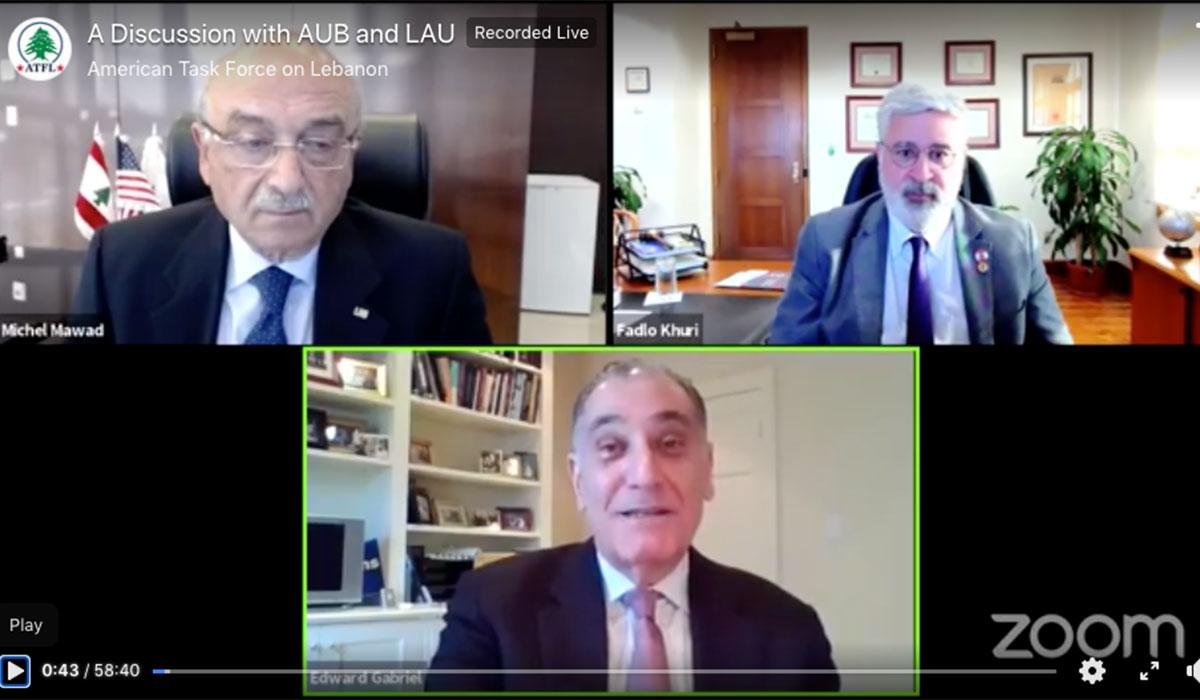LAU and AUB Will Endure
In conversation with ATFL, Presidents Mawad and Khuri discuss unprecedented challenges, the value of an American-style education, and the pressing need for aid.
In a webinar hosted by the American Task Force on Lebanon (ATFL), LAU President Michel E. Mawad and President of the American University of Beirut (AUB) Fadlo Khuri spoke candidly about the most pressing challenges the two universities are facing, the importance of fostering American values in the region, the role that the new generation can play in shaping Lebanese politics and the vital need for aid.
Kickstarting the discussion on the value of an American-style education in Lebanon, ATFL President and former Ambassador Edward Gabriel described this critical point in Lebanon’s history as a “quintuple punch in the stomach.” The economic meltdown, political crisis, the pandemic, the aftermath of the largest non-nuclear explosion, and the highest number of refugees-per-capita in the world have all placed “Lebanon on the brink of failure,” he said, “and it is not in the interest of the United States to see it fail.”
Drs. Mawad and Khuri explained what this means for the two universities that were founded by American missionaries, and how they have responded so far to the educational and health challenges.
Acknowledging the lifeline that the US, the Lebanese diaspora and alumni have thrown to LAU in its fight against COVID-19 and in the wake of the August 4, 2020 explosion, Dr. Mawad said that dwindling revenues and skyrocketing expenses have nevertheless forced the university to resort to extreme survival measures.
Both LAU and AUB have reluctantly had to adjust the tuition exchange rate of the Lebanese pound to the Dollar to a fourth of its value on the parallel market, where its official value plunged below one-tenth.
Despite a deficit in the university’s operating budget and an unprecedented need to dip into the endowment fund, he continued, LAU raised its financial aid to more than $80 million per year, covering 70 percent of the student body, to ease the financial burden on students and parents and ensure that “no student is left behind if he or she cannot afford to pay tuition.”
“As essential services to live in dignity have painfully disappeared,” the dire economic situation has led to a brain drain at an alarming rate. The loss of a great number of American Board-Certified physicians – around 15 percent at LAU – and top-notch faculty, who have returned to the US or took jobs in the MENA region, threatens to affect the quality of medical education and research.
For over a century, agreed the two presidents, the “American-style” education that LAU and AUB have offered has had a transformative impact in Lebanon and the Middle East.
A liberal arts education, core American values of human rights, the rule of law, gender equality, peaceful dialogue and respect for individual freedom have “found their embodiment at LAU and AUB,” said Dr. Mawad, in their culture of diversity, inclusiveness and tolerance. Together, “they represent the greatest possible return on investment by the US in shaping the minds and characters of the youth in the Middle East,” who would go on to promote the principles of democracy and equality needed to secure peace and build a state of law in Lebanon.
Generous grants received through the US Agency for International Development (USAID) and the Middle East Partnership Initiative (MEPI), he went on to say, have also placed LAU at the forefront of civic engagement, with millions of hours invested in teaching and service to the community. While the two universities are doing their best to maintain these standards, difficulties with faculty and student retention cannot be underestimated.
On the role the new generation can play in shifting the status quo, Dr. Mawad noted tangible differences in the student council performance this year, following a win for independent candidates, who did not hail from traditional political parties.
The students learned to build alliances, work with constituents, represent colleagues and earn a seat at the table within LAU’s shared governance structure, at a time when upheaval on the streets prompted some to suggest suspending student council elections. “We abided by our values of holding transparent, free and fair elections,” he said.
In their final plea to attendees, both presidents urged Lebanese Americans to continue to support their institutions.
“I have seen firsthand how every American tax dollar spent on education in the US can yield lifelong bonds of friendship, research collaboration, political stability, as well as immediate and long-term economic benefits,” Dr. Mawad pointed out, having lived in the US for more than 45 years. “These American values have really withstood the test of time. Please help us keep them alive in this part of the world.”
In closing, Ambassador Gabriel assured the presidents that they could count on the American government and Lebanese Americans to support their enduring commitment to an American-style education.
You can view a recording of the discussion here.
